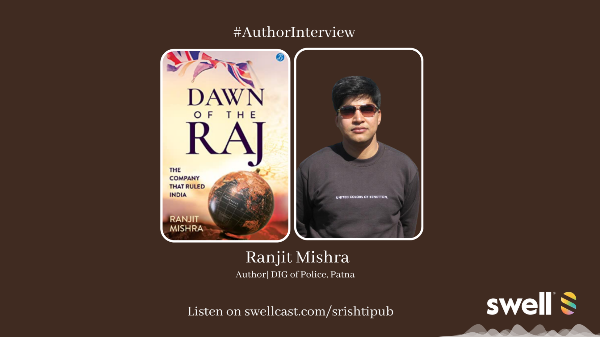
@SrishtiPub
Creating Bestsellers! Welcome to the official Swellcast of Srishti Publishers. To know more visit our website - www.srishtipublishers.com
Dawn of the Raj - Author Ranjit Mishra in Conversation.
Hello, everyone. It's a pleasure to welcome Ranjit Mishra, author of Dawn of the Raj, to the literary community on Swell to talk about his book published by Srishti. Mr. Mishra is an IPS officer with over 14 years of experience in law enforcement, crime control, anti Naxal operations and law and order maintenance. He's currently posted as DIG of Police and lives in Patna
Ah, Mr. Mishra, you have authored two books. Your first one was Beyond Reasonable Doubt, and the latest one is dawn of the Raj. And both these books have as their primary focus various aspects of colonial rule in India. While your latest book traces the rise of the East India, accompany your previous book delves into crime stories from the journals of an Anglo Indian police officer under the Raj. I'm very curious to know what got you so interested in researching and writing about India's colonial history
Ranjit Mishra
@Ranjit.Mishra · 1:01
For example, like whenever you're having a cup of next cup of tea just try to think how tea came in India, who introduced tea? And if you do a research on that you will find that even the tea that you drink few cups every day it has got a very interesting history in India. So history is actually very interesting. And that is how I picked up. Thanks
Dawn of the Raj seeks to chronicle the East India Company's initial strategic entry into the country, their struggles with their European rivals, the Mughals and the Marathas in ascendancy I'm sure the book would have entailed a lengthy research process. Could you tell us about how you went about doing your research for this book and did it overwhelm you at some point trying to tell the chequered story of the formidable East India Company?
Ranjit Mishra
@Ranjit.Mishra · 2:44
You actually this is a very interesting piece of history of East India Company which is not very much covered in many of the textbooks. If you look at you remember in the there used to be a lot of Amitabh bachelor movies in which there is a story of a very weak child or very disadvantaged and child who grows on to become a big powerful person, superstar kind of thing
Thank you for that. Something that got me pondering was also about how the British were different from the invaders who had previously come to India. In the sense that the British took away money and resources from India and sent them back to England, while invaders before them, like the Mughals, had preferred to stay on assimilating it and had started seeing India as their home. They invested in India
Ranjit Mishra
@Ranjit.Mishra · 2:41
But there is another set of invaders who came, plundered and returned back. So English are not the only exception, but what is unique from all other invaders are it was not one individual coming or one dynasty coming. It was a commercial organization which came with a certain specific purpose. And as things unfolded, its own charter changed and from near commercial entity, it graduated into an imperialistic one
Ranjit Mishra
@Ranjit.Mishra · 3:45
But I think the other way around is also equally true. For example, like when British came to rule India, there are a lot of Indians like India at that time included the present India, Bangladesh, Burma and also so lot of Indians went back to London and so you can see that today chicken tikka and butter chicken have become a national dish in Great Britain. So I think the cultural exchanges because of contact are there and I think they will stay for quite long time


